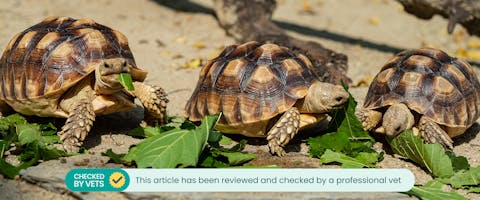Updated 18/12/24
Whether you’re pet sitting a tortoise, or you’re a soon-to-be tortoise parent (congrats!), it’s good to have a thorough understanding of the tortoise diet beforehand. To many of us humans, tortoises look like tough adventurers who very much go at their own pace. Therefore, it’s easy to assume they’ll eat almost anything green. This couldn’t be further from the truth.
So, before you go throwing your kitchen compost waste into their tanks, we’re here to help guide you on all things tortoise food, what they can and can’t eat, and how often they should snack. Slow and steady wins the race, pet people, let’s learn some stuff about the tortoise diet.
Trending posts
Purr-use some of the top blogs our members have been loving this month- Top male dog names for your new furry friendGot a new furry family member in your pack? Check…

- Top female dog names for your new fluffy palWelcoming a new pooch into your family? Explore…

- 250+ gray cat names your silver feline will loveRecently welcomed a fluffy gray bundle of joy into…

- What are normal pet sitting rates?Discover the average pet sitting rates for animals…

- Unique dog names to stand out from the packDare to be different with our list of the best…

How often do tortoises eat?
Many tortoise species originate from arid environments where food is not plentiful and the tortoises need to move around constantly to find edible plants. Domestic tortoises are often supplied with plentiful food in a smaller location, so care must be taken not to overfeed and to encourage adequate movement.
Pellet tortoise food should be given to them once a day alongside fresh grass, hay, and constant access to clean water. Very young tortoises can be fed twice daily. While they often enjoy certain fruits, vegetables, and greens these don’t need to be given to them every day. Although dark leaf foods like kale and cabbage provide important nutrients for them, salad items like Romain lettuce contain little fiber which is not good for tortoise digestion and can lead to loose stools.
In the wild, tortoises eat a huge variety of plants, so mixing things up foodwise is a very important part of tortoise care, as their digestive systems are not designed to eat large amounts of any one plant, but instead small amounts of a large variety.
What veg can tortoises eat?
You’d think the hardy tortoise would be able to munch on almost any vegetable that crosses its path. In fact, they have a rather delicate digestive system, meaning you need to be careful with what you feed them. Veg-wise, these are a few safe options to try once or twice a week:
- Cabbage (in small amounts)
- Kale
- Cucumber
- Spring greens
- Spinach
- Watercross
- Courgette
- Rocket
- Chard
Similarly, with fruit, while your tortoise might love the taste of sweet strawberries or melon, most fruits cannot be tolerated by a tortoise's digestive system. Use them as a treat food for a tortoise occasionally - a strawberry or a couple of blueberries a week.
What can tortoises eat from the garden?
As scavengers of leafy greens, the tortoise diet should also include some yummy leaves from certain wildflowers. Plants and edible weeds are excellent additions to your tortoise’s diet and can be given in larger quantities than fruits or vegetables. Most of these can be found in your backyard or local park:
- Dandelion
- Grass
- Hay
- Clover
- Chickweed
- Petunia
- Geranium
- Bergamot
- Dalia
- Evening primrose
- Hollyhock
- Pansies
Make sure you always check that what you’re feeding to your tortoise is what you think it is. Always consult your vet before adding anything new to your diet.
Foods to not add to a tortoise diet
While the tortoise diet should be varied, there are a few things you should definitely not include in their daily dishes:
- Romain lettuce
- Carrots
- Avocado
- Citrus fruits
- Peas
- Beans
- Rhubarb
- Aubergine
- Some flowers: lupin, foxglove, rhododendron, hydrangea, azalea, hellebore, peony, daffodil, mistletoe, crocus and ragwort
These range from being either indigestible to poisonous. If you’re concerned about something your tortoise has eaten or would like to learn more about the tortoise diet, talk to your veterinarian or vet nurse for advice or help.
Meet our veterinary expert, Lizzie
This article has been checked by veterinarian Lizzie Youens BSc(Hons) BVSc MRes MRCVS. Lizzie graduated from the University of Bristol in 2011, and has been working in first opinion companion animal practice. She has worked in a variety of clinics across the UK, from large hospitals to small branch practices. She enjoys doing a mixture of medicine, surgery and emergency work. Lizzie currently works in a small rural practice where she enjoys working in a close-knit community.
Keen to start having your own tortoise adventure? Find a tortoise house sit either nearby or on the other side of the world - put your reptile knowledge to use and provide loving in-home care for a new tortoise friend. Or, if you’re a tortoise parent, check out the latest sitters near you who know all about the tortoise diet and world of reptiles.

